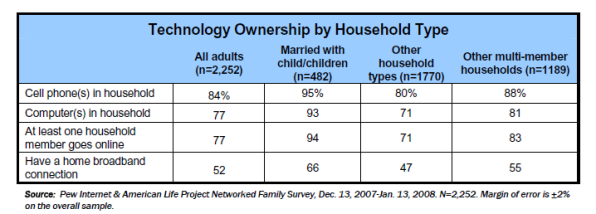To all those who feared that technology pulls people apart, a new report from the Pew Internet & American Life Project on the American family reveals the opposite is true: today’s families are more connected than ever. However, this always-on interaction with technology has a darker side too…one which leads to higher stress and less satisfaction with both family and leisure time. In reviewing the data, we discover that technology is really both a blessing and a curse.

The Good News
The study revealed that within American families, technology is enabling a new form of connectedness – something that wasn’t even possible only a few years ago. Tools like cell phones and the internet have greatly impacted the way we communicate. Today, owning multiple gadgets and communication tools is a standard feature of family life:
- 58% of those living in married-with-children households own two or more desktop or laptop computers. Nearly two-thirds of those living in multiple-computer households (63%) link those computers in a home network.
- Both spouses use the internet in 76% of married-with-children households, as do 84% of their children aged 7-17. Indeed, 65% of married-with-children households with a child between the ages of 7-17 contain a husband, wife, and child who all use the internet.
- 89% of married-with-children households own multiple cell phones, and nearly half (47%) own three or more mobile devices. Children in these households are somewhat less likely to own a cell phone than they are to go online: 57% of these children (aged 7-17) have their own cell phone.

The proliferation of these tools has allowed for increased connectedness with others. 33% of internet users say it has improved connections to their friends and 23% say it has improved connections with their family. Families are now able to stay connected throughout the day, even as they go their separate ways. Whether through webcams, cell phones, email, IM, there are numerous ways that families can communicate with each other and coordinate activities.
Even internet use, once thought to be more of a solitary activity, is now becoming more of a shared experience. According to the report, 52% of internet users living with a spouse and one or more children go online with another person at least a few times per week. And 34% of families have had shared internet experiences at least occasionally.
In addition, a full quarter of adults (25%) believe that technology has allowed their family to become closer now than their family was when they were growing up.
The Bad News
The flip side of that last figure is that 60% of respondents feel that new technologies have not made their family any more or less close than families in the past. The PEW report spins this finding with a headline that reads: “A majority of adults say technology allows their family life today to be as close, or closer, than their families were when they grew up.”
But, wait…hold up there for a minute…you could also say that a majority (60%) believe technology has had no impact on their closeness as a family. And that’s an entirely different read on the finding.
When you take into account how the internet impacts people’s work lives, the picture isn’t quite as rosy, either. There’s a group of people who feel that today’s increased connectivity has led to an increased workload: 19% say that the internet has increased the time they spend working from home, for example, and 11% feel that it has contributed to increase hours at the office.
Because people are now working longer hours, in part due to this increased use of the internet, they’re finding decreased satisfaction in other areas of their life. The impact of their heightened connectivity is leading to things like less time for family dinners and higher levels of dissatisfaction with the time they have for leisure pursuits. While nearly half (49%) of respondents are satisfied with the amount of time they spend with their families, only 1 in 3 are satisfied with the time they have for relaxing, for hobbies, and for clubs or other activities.
Wrapping It Up
Simply put, technology may bring us closer, but, as this study shows, its constant use also means that we may be sacrificing other activities in order to fit it into our schedule. It really is both a blessing and a curse in many ways.
As RWW’ers, we can ask ourselves how technology has impacted our lives and we’re sure to find that we’ve somehow both gained more and given up more than the average American family. As with anything, the key is moderation and finding balance. Technology may bring amazing improvements to our lives, but it can come with a price. For those who love technology unabashedly, that price may be higher than expected.
Image credit: iPhone with transparent screen, edans

















